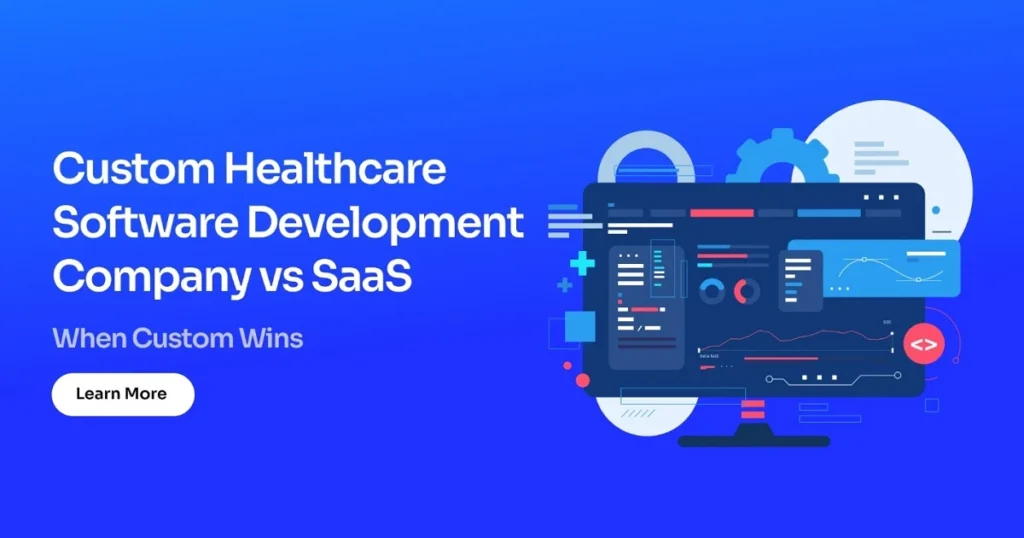Healthcare organizations face a critical decision when adopting new technology: invest in a ready-made SaaS platform or commission a custom-built solution. Both paths promise to streamline operations, enhance patient experiences, and ensure compliance, yet the implications for cost, security, and adaptability are very different.
SaaS platforms often appeal with rapid deployment and predictable subscription pricing, making them an attractive choice for basic, non-core functions. However, when the software must integrate deeply with existing systems, meet complex compliance requirements, or enable competitive differentiation, a tailored approach may offer greater value.
This article examines the strengths and limits of each option, then highlights scenarios where a custom healthcare software development company can deliver strategic advantages that a one-size solution cannot match.
SaaS in Healthcare
Software-as-a-Service (SaaS) platforms are hosted by third-party providers and accessed over the internet on a subscription basis. They are designed for fast deployment, minimal internal IT involvement, and predictable monthly or annual fees. Many come preconfigured for common healthcare needs such as scheduling, billing, or patient communication. While this reduces setup time, customization is typically limited to what the vendor’s framework allows.
Custom Healthcare Software
A custom-built solution is designed specifically for an organization’s unique workflows, regulatory obligations, and integration requirements. The development process starts with discovery sessions to map operational needs, followed by tailored architecture, coding, testing, and deployment. Ownership of the codebase allows full control over features, data handling, and future enhancements, enabling the software to evolve alongside the organization’s strategic goals.
Head-to-Head Comparison
| Decision Factor | SaaS Approach | Custom Development |
| Compliance and Security | Vendor-managed compliance like HIPAA; updates and audits follow vendor schedules. | Compliance built into architecture; control over audits, data storage, and access policies. |
| Workflow Alignment | Designed for general use; limited fit for unique processes. | Tailored to mirror specific workflows, reducing process changes. |
| Integration and Interoperability | Standard APIs available; complex integrations can be challenging. | Designed for deep integration with EHRs, devices, and specialized apps. |
| Data Ownership and Portability | Data resides in vendor environment; may incur costs or barriers to extract. | Full data ownership and portability, with flexibility for future transitions. |
| Cost Over Time | Lower upfront costs but recurring license and user fees increase total cost. | Higher initial investment but no recurring license fees, often lower long-term cost. |
| Scalability and Feature Control | Scaling and features depend on vendor’s roadmap. | Full control over scaling and feature development on your schedule. |
When SaaS Wins
- Speed to Deployment – SaaS solutions can be operational within days or weeks, which is valuable when meeting tight timelines for non-critical functions.
- Lower Initial Costs – Subscription pricing reduces upfront capital expenditure, making it easier for smaller organizations or departments to get started.
- Limited Internal IT Resources – Vendor-managed hosting, security updates, and backups reduce the burden on in-house teams.
- Standardized Processes – For workflows that follow widely used patterns, such as appointment scheduling or basic billing, SaaS can meet requirements without extensive customization.
When Custom Wins
- Complex Compliance Needs – Projects that must meet IEC 62304, ISO 13485, ISO 14971, or unique data residency rules benefit from software built to those specifications from day one.
- Deep Integration Requirements – When software must connect to multiple EHR systems, medical devices, and specialized portals, custom development ensures compatibility and performance.
- Long-Term Cost Efficiency – The absence of recurring license fees and the ability to enhance features internally can make custom solutions more economical over several years.
- Unique Competitive Features – If your software needs to deliver a patient or provider experience that sets you apart in the market, custom development offers full creative control.
- Scalability on Your Terms – Growth, additional modules, and performance tuning can be planned and executed without waiting on a vendor’s release cycle.
Decision Workflow
- Define Core vs. Commodity Functions – Identify which workflows are mission-critical and which can run on standardized solutions.
- Assess Compliance Requirements – Map out every regulation, certification, and security standard your software must meet.
- Evaluate Integration Points – Document all systems, devices, and data flows that the new software must connect to.
- Compare Five-Year TCO – Model the total cost of ownership for SaaS and custom approaches, factoring in licenses, scaling costs, and future enhancements.
- Run a Pilot – Test a limited scope in a real environment to confirm performance, usability, and integration success before committing fully.
Choosing between SaaS and custom healthcare software depends on how critical the application is to your operations, how complex your compliance landscape is, and how much control you need over features, data, and integrations. SaaS offers speed and predictable short-term costs, while custom solutions provide adaptability, long-term value, and strategic differentiation.
If your goals involve deep integration, advanced security, or features that define your competitive edge, partnering with an experienced custom healthcare software development company can help you design and deliver a solution built precisely for your needs.







